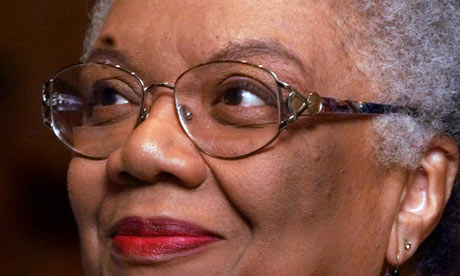Martin Luther King Day
In honor of Martin Luther King, I went rummaging back into Lucille Clifton’s early race poetry. Clifton’s first book of poetry came out in 1969, which is to say at the height of the black militancy movement. Some of the poems reflect the Black anger of the time, but Clifton never entirely succumbs to it. Always she uses her poetry to find a solid place on which to stand and anger is never her last resort..
I’ve written earlier on “the meeting after the savior gone,” in which she acknowledges the sense of being lost after King’s assassination. After declaring, “now i guess you got to save yourselves,” the poem concludes with a parenthesis:
(even if you don’t know
who you are
where you been
where you headed)
Many of the poems in her early books show Clifton trying to understand young angry black men, some of whom have turned to violence. She is more sympathetic than many today would be, and her poem about a heroic Eldridge Cleaver is more than I think he deserves (this cleaver “will not/rust/break, or/be broken”). One is reminded in these poems how hotly anger burned when African Americans felt free to express it openly in the late 1960s and early 1970s.
But Clifton isn’t ever entirely on board. In “apology (to the panthers)” she talks about having to be talked around to appreciating the Black Panthers. Some of her poems about “tyrone” and “willie b” don’t so much approve of these race riot participants as seek to understand them. Clifton is always exploring.
But if she is unsure about militancy and the internal splits between liberal and militant Blacks, she’s not unsure about her advocacy for the oppressed. Her guiding star, as I’ve noted in previous posts, is always to “comfort the afflicted and afflict the comfortable.” In “listen children” she puts herself forward as a wise mother who can see the truth that transcends all divisions.
While one doesn’t want to overly sentimentalize Clifton, who has some sharp edges, the warm and inclusive voice one sees in this poem is key to her popularity. Her concluding advice makes me think of slaves secretly passing on a dangerous or liberating message. African American power, as Martin Luther King understood well, lay in a sense of solidarity, and love was more effective than anger at cementing bonds.
listen children
By Lucille Clifton
listen children
keep this in the place
you have for keeping
always
keep it all ways
we have never hated black
listen
we have been ashamed
hopeless tired mad
but always
all ways
we loved us
we have always loved each other
children…….all ways
pass it on
Additional note – I’ve just returned from our college’s annual Martin Luther King Prayer Breakfast, where we heard talks by a prominent Democrat (Steny Hoyer) and a prominent Republican (Michael Steele). It made me wonder whether we could extend Clifton’s words about rifts within the African American community to America as a whole. Both men talked about “reaching across the aisle” to address common concerns, whether with regard to the rollback of voting rights amongst minority voters (Hoyer) or the death rate amongst African American youths in the inner cities (Steele).


